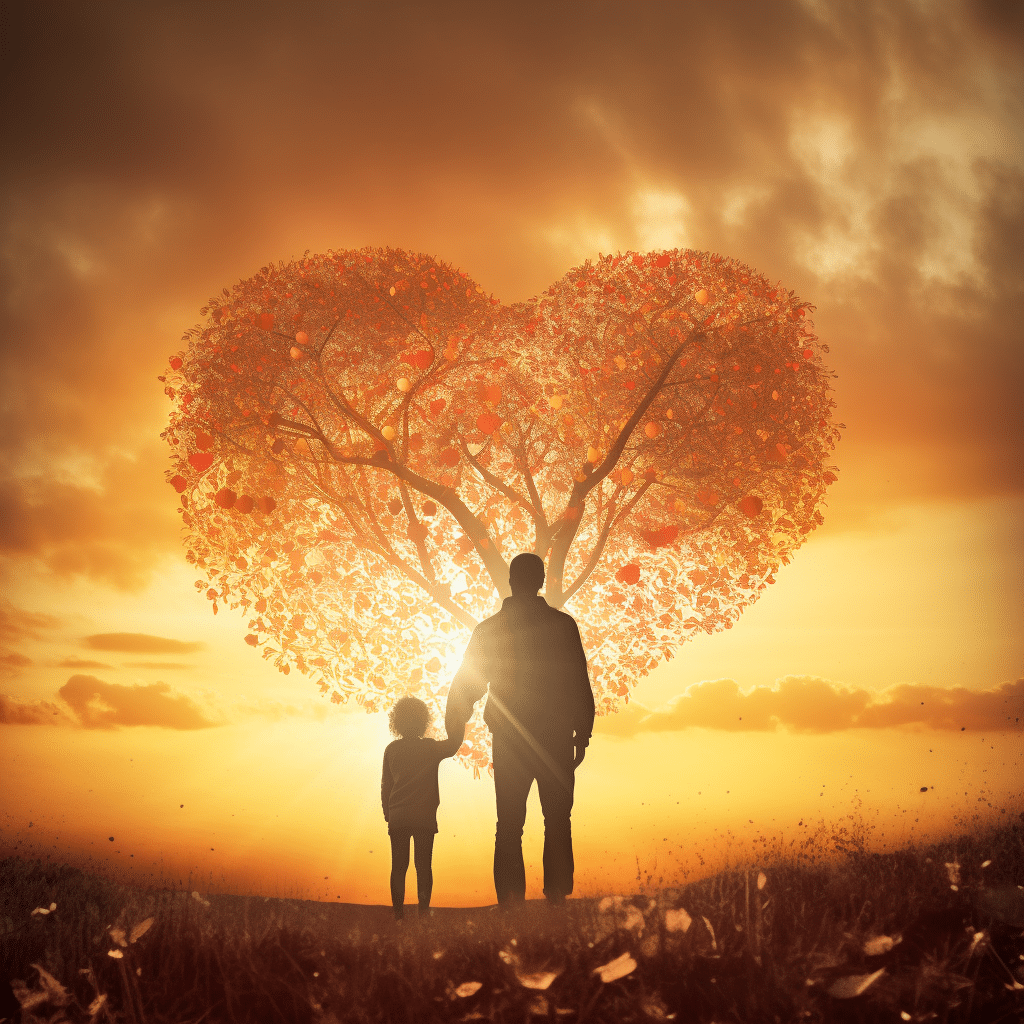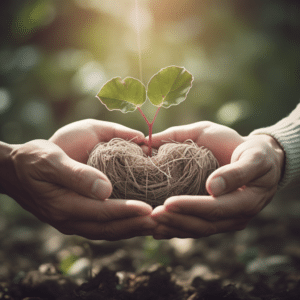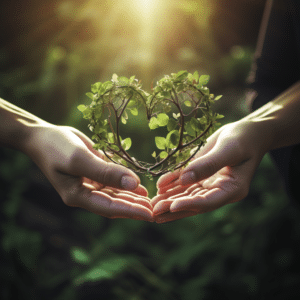
Distinguishing Love from Attachment: Nurturing Healthy Bonds
Love from Attachment
Love and attachment are two terms which are confused. But they bring different meanings and implications to our lives. Love is a complex emotion which reflects deep care, affection and compassion for someone. It is selfless, supportive and nurturing and it is all about wanting the other person’s well-being and joy. Attachment, on the other hand, is an emotional bond or dependency towards someone or something which brings comfort and security. Whereas love encourages growth and freedom, attachment can lead to possessiveness, fear of loss and emotional dependence.
The concept of love has been studied for ages in literature, art and philosophy. It is usually seen as the strongest form of human link – an intense experience that surpasses superficiality. Love allows us to look past outside features or flaws and appreciate the beauty within others. It creates a sense of unity and understanding between people, and it gives us strength in difficult times.
Defining Love and Attachment

Love encourages independence and autonomy, unlike attachment which relies on another person. To illustrate this difference, let’s look at Sarah and John’s relationship. They had a strong bond based on trust and understanding, and when John had to move away, their love only grew stronger.
However, Emma’s relationship with Mike was attachment-based. She relied heavily on him for emotional support and needed his presence to feel secure. Her anxiety and fear of abandonment grew when he was away.
Characteristics of Love
Love is a mysterious emotion, which has been thought about, studied, and written about for centuries. It is often described as a strong attachment and fondness for someone or something. Love has no boundaries of time, space, and logic. It has many features and covers a wide range of emotions, actions, and behaviors.
- Unconditional: Love exists just for itself, not depending on any external factors or conditions.
- Selfless: One puts the wants, desires, and joy of others before their own.
- Empathetic: To understand and share the feelings and experiences of another person.
- Supportive: Offering safety and ease to those who receive it.
- Growth-oriented: Encourages personal development, growth, and transformation in both involved.
- Spiritual: Connects people on a deeper spiritual level, beyond the physical.
Love is not only in romantic relationships; it can exist between friends, family, pets, and even towards a concept or a purpose. Every intimate bond made because of care and real interest holds the essence of love.
Even though each individual’s experience with love can differ due to their personal situations and personality, it is still an essential part of being human. The expression of love differs from culture to culture, but its main features stay the same.
One fantastic example that displays the characteristics of love is the story of Mother Teresa. Despite living in poverty herself, she devoted her life to aiding others without any hope for reward or fame. Her selflessness, compassion, supportiveness, growth-oriented attitude, and spiritual connection with those she served were all forms of true love.
Characteristics of Attachment
To understand the characteristics of attachment, delve into the emotional dependence, fear of loss, and possessiveness that come with it. Explore how these sub-sections shed light on the nuances of attachment and its impact on relationships and personal well-being.
Emotional Dependence
Emotional dependence is a deep bond between two people. It means relying on someone for emotional support, validation and safety. This comes from a strong trust built over time. Seeking comfort, understanding and reassurance from the attachment figure during times of trouble or doubt is a part of this.
The attachment between individuals is crucial for emotional health. Emotional dependence shows how their emotions are connected. They can share happiness, sadness and fear, knowing they will be understood. More than seeking advice, it’s about feeling worth and identity through the relationship. This gives a sense of belonging and acceptance. It also helps to grow together, forming resilience and strength.
Tip: Emotional dependence can be healthy in secure attachments. But it’s important to be independent too. Balance between independence and interdependence allows for personal growth and connection in relationships.
Fear of Loss
Fear of loss can create intense emotions, such as anxiety, insecurity, and possessiveness. It can shape relationships, making people overly clingy or distant. In some cases, it can even lead to sabotaging behavior.
Prolonged fear of loss may result in attachment disorders, making it difficult to form healthy relationships. Fear of loss can also manifest differently for different people. For example, some suffer from constant worrying about the loss of loved ones, while others struggle with trust issues due to past experiences.
Bowlby (1980) found that the fear of loss is part of our evolutionary need for protection and survival. Our attachment systems are designed to ensure our safety and wellbeing, by forming strong connections with caregivers or loved ones.
Possessiveness
Possessiveness in relationships can be rooted in fear of losing the person one loves. This can lead to controlling behaviors, jealousy, and the need for reassurance. It can also be perceived as a sign of love and deep attachment, offering security and exclusive rights over a partner or possessions.
Yet, excessive possessiveness can be damaging. It may cause feelings of suffocation, resentment, and a lack of freedom for the other person. Cultural norms and personal upbringing can influence the level of possessiveness. For instance, in medieval times, feudal lords used their power to assert possession over land and people, even waging wars.
Understanding possessiveness helps us have better relationships. We should be aware when it is a healthy expression of attachment or when it becomes controlling or damaging. This can help us create balanced and fulfilling connections with those we care about.
Differences between Love and Attachment
To understand the differences between love and attachment, delve into the nature of feelings, level of selflessness, and impact on personal growth. Explore the unique qualities of each and their distinct effects on relationships.
Nature of Feelings
Feelings – a mysterious part of humanity! They have the power to control our lives and relationships, like a compass guiding us through the maze of emotions. Love and attachment – two feelings that are often different, but also intertwined. It’s important to understand these emotions to work out the complexities of human connection.
Attachment is different. It’s about relying on someone else for security and familiarity. It’s about the need for routine and stability in relationships. It gives us a sense of safety. But if it’s not balanced with personal growth, it can make relationships stagnant.
Love is accepting, while attachment is possessive. Love celebrates individuality and lets relationships grow. Attachment is based on fear or insecurity and can lead to control over someone else’s life.
To make sure love is more important than attachment, we can follow these tips:
- Open communication is key for genuine connections. Talking openly and honestly makes both partners feel heard.
- Being vulnerable helps deepen love. Revealing yourself without fear of rejection strengthens relationships.
- Boundaries are important for preserving independence. They create space for self-discovery and prevent attachment from taking over.
By learning the differences between love and attachment, and following these tips, we can make relationships healthy and fulfilling. Love, if nurtured, has the power to change lives, while attachment can stop true emotional connection.
Level of Selflessness
Love and attachment can be alike, but they differ when it comes to selflessness. Love is characterized by deep care and interest for another’s well-being. Attachment is more about one’s own needs and wishes.
- Love is selfless, but attachment is self-centered.
- Love entails sacrifices for another’s happiness. Attachment is all about meeting one’s own needs.
- Love is unconditional. Attachment may have conditions.
- Love encourages another’s authenticity. Attachment can lead to control.
- Love bolsters personal growth. Attachment may stunt it.
- Love keeps boundaries. Attachment may blur them.
Sometimes love and attachment mix, but love is more than just attachment. It puts another’s well-being before one’s own. To build selfless relationships, try active listening, empathy, and open communication. This helps make strong bonds of mutual respect.
Impact on Personal Growth
Love has the power to nurture personal growth; it gives us security and self-acceptance to reach our fullest potential. Whilst attachment can restrict our individual development, when it’s in balance it can create the right environment for us to grow.
We ought to take a mindful approach to love and attachment for optimal growth. Self-love is key to setting the groundwork for healthy attachments and independent growth.
Similarities between Love and Attachment
To deepen your understanding of the similarities between love and attachment, delve into the emotional connection and desire for intimacy. Explore how these two sub-sections shed light on the shared aspects of love and attachment, allowing you to grasp the nuances of these complex human experiences.
Emotional Connection
An emotional connection is a must for both love and attachment. It’s an abstract link that binds two people, giving them a deep understanding and compassion. It goes beyond words and actions and lets individuals truly feel each other’s feelings without speaking.
In love, this connection is the foundation of a secure and healthy relationship. It helps partners connect at a deeper level, encouraging trust, closeness, and backing. With this bond, couples can conquer the highs and lows of life, knowing they have each other.
Similarly, an emotional connection is also seen in attachment. It’s the basis of the bond between parents and their kids or close friends. This connection brings a feeling of security and comfort, knowing someone cares for us. It lets people rely on each other emotionally, providing a safe place to express thoughts and emotions without judgement.
What separates an emotional connection from other types of relationships is its capability to survive distance and time. Even when far apart, the emotional bond stays in place. It’s this lasting connection that holds long-distance relationships together or brings comfort during times of absence.
To understand the power of an emotional connection, one must experience it. Through these connections, we feel appreciated, valued, and adored. Without it, there’s a risk of feeling isolated or detached from those around us.
Take a moment to consider your relationships. Nurture those emotional links that mean the most. Reach out to loved ones to remind them how important they are. Appreciate these connections for they improve our lives in countless ways.
Don’t let the fear of missing out on these powerful connections drive you further away from those you care about. Grab every chance to strengthen your emotional bonds and benefit from the joys of love and attachment.
Desire for Intimacy

A profound yearning resides in human hearts: the need for closeness. It transcends norms and boundaries. It isn’t just physical attraction; it’s about vulnerability and trust.
Love and attachment have something in common. Both involve a strong emotional bond. Love sets our hearts on fire; attachment gives us security and stability.
The desire for intimacy is not only in romantic relationships, but also in friendships and family. It binds us together. We seek meaningful interactions, fostering bonds of joy, support, and understanding.
Throughout history, stories demonstrate the power of intimacy. From Romeo and Juliet to Ruth and Naomi, these tales show the immense impact close connections can have on us.
Conclusion
Love and attachment look alike but are actually quite different. While love is altruistic and welcomes emotional closeness, attachment is possessive and stifling.
It involves supporting each other’s goals and encouraging growth. Love is unconditional, accepting all the good and bad.
Attachment is motivated by a fear of abandonment. It is desperate for validation and security from someone else. Attachment often leads to jealous, possessive behavior and can make it hard to let go of a bad relationship.
Love encourages personal growth and respect for autonomy. Attachment, however, restricts growth and needs constant reassurance.
One story that illustrates the difference between love and attachment is the mythological tale of Orpheus and Eurydice. Orpheus loved Eurydice deeply and was determined to save her from the underworld. Hades allowed her to return with one condition – Orpheus must not look back until they reached safety.
Frequently Asked Questions
FAQ 1: What is the difference between love and attachment?
Answer: Love is a deep affection and care for someone, characterized by selflessness, empathy, and a desire for their happiness. Attachment, on the other hand, is a strong emotional bond based on dependency, possessiveness, and fear of loss.
FAQ 2: How can I differentiate between love and attachment in a relationship?
Answer: Love in a relationship allows for personal growth, individuality, and freedom, while attachment tends to be controlling, restrictive, and focused on one’s own needs. Love encourages mutual support and respect, whereas attachment often leads to clinginess and jealousy.
FAQ 3: Can love turn into attachment?
Answer: Yes, love can sometimes evolve into attachment when fear or insecurity play a dominant role in the relationship. This shift can happen gradually and it is important to be aware of the signs to maintain a healthy balance between love and attachment.
FAQ 4: Is attachment always unhealthy in a relationship?
Answer: Attachment itself is not necessarily unhealthy, as some level of emotional bonding is natural in any relationship. However, an excessive attachment that causes distress, possessiveness, or hinders personal growth can be detrimental to both individuals involved.
FAQ 5: Can you have love without attachment?
Answer: Yes, it is possible to experience love without attachment. Love that is based on genuine care, respect, and selflessness allows for individual freedom and growth, without the need for possessiveness or fear of loss.
FAQ 6: How can I cultivate a healthier love and minimize attachment?
Answer: To cultivate healthier love, it is important to foster open communication, trust, and respect in a relationship. Recognize and work on personal insecurities, practice self-love, and allow space for individual growth. Developing a secure sense of self can help minimize the tendencies towards attachment.
